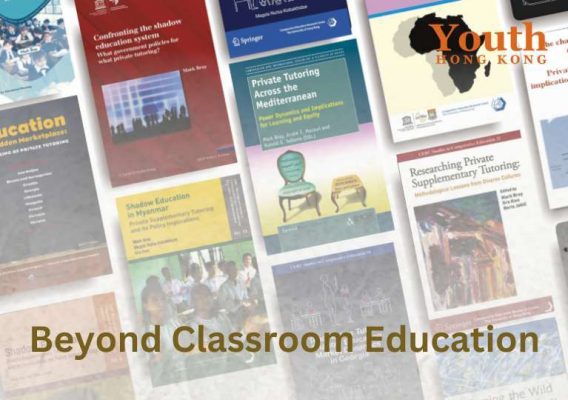//vol.15-2 Interview
Private, supplementary tutoring outside the formal education system – or what Dr Nutsa Kobakhidze calls “Shadow Education” – has become a global phenomenon.
- Whether as a means to offer additional support or advantage, the aim is still academic achievement.
- Finding a balance that does not add to the stress levels of students should always be a priority for parents and teachers.
- 無論是作為學校以外的學業支援,學生補習或是一種優勢,共最大目的終歸是追求學習成績上的進步。
- 家長和教師必須尋找一個平衡點避免因此而加重學生壓力。
Can you explain what you mean by ‘‘shadow education’’?
Shadow education is a metaphorical term for educational activities that operate outside of the formal education system. Tutoring, for example, often “shadows” the curriculum of mainstream schools, but may also cover materials that go beyond, or differ, from that taught in schools. While the term is widely used in academic literature, teachers, parents and students are unlikely to refer to tutoring activities in everyday life as “shadow education”.
What other terms are used?
The tutoring activities that comprise shadow education have distinct names and take different forms around the world. In Japan for instance, it is known as juku. In South Korea, afterschool programmes are known as hakwon, and in Taiwan, buxiban. In Greece, tutoring is referred to as parapedia. In Russia and throughout the former Soviet Union repetitorstvo denotes private tutoring, and a private tutor is called a repetitor. In countries where English is more commonly used, such as Pakistan, India, and Singapore, the term private tuition is often used.
So, is this a phenomenon that has no geographical limitations?
Once considered an East Asian phenomenon, research from Europe, Africa, and North America indicates that private tutoring has become prevalent in these regions. It is also becoming increasingly popular in Scandinavian countries, even though governments in these countries discourage excessive competitiveness and promote equal opportunities for all students through well-funded public education systems. Here, private tutoring is still an attractive option for those seeking additional support and personalised attention.
The main motivations for tutoring services are to achieve good marks, increase confidence, keep up with peers, and improve academic achievement.
Where does Hong Kong fit into this?
In Hong Kong, shadow education has a long history and takes distinct forms that are unique to us. The ‘star tutors’ employed by large tutorial companies and featured in stylish attire on billboards, trams, and buses are an example of this. Video classes are available, where students can receive help from teaching assistants. This tutoring is aimed at students facing intensively competitive end-of-secondary-school examinations and is focused on analysis of question types and understanding marking schemes.
Tutoring in Hong Kong is also prevalent in young children, which has become a cause for concern. Some families seek tutoring for their children to give them an early advantage in education and a head start in life, and to gain admission to good primary and secondary schools, even to gain admission into kindergartens and playgroups. A very recently published paper on tutoring for kindergarten admissions explains this in more detail.1
Is it fair to say that the tendency for schools to focus primarily on examination scores, PISA rankings, and other assessment tools has led to its proliferation?
In countries where high-stakes exams and standardised tests are common, such as Hong Kong, mainland China, Korea, Japan, and Singapore, private tutoring services are in high demand as families seek additional academic support. These countries have highly competitive education systems, and admission to prestigious universities depends on exam scores.
While these countries tend to rank highly in PISA rankings, achieving this is primarily a governmental goal. For students and families seeking tutoring services, the main motivations are to increase confidence, keep up with peers, improve academic achievement and get good marks.
Do you think shadow education exacerbates the ‘commercialisation’ of education, potentially widening the gulf between those who can and those who cannot access it?
A frequently discussed issue relating to shadow education is its potential for exacerbating social inequality, since tutoring requires resources that poor families do not have. The marketisation of education and wider neoliberal policies have allowed shadow education businesses to flourish, and education is increasingly viewed as a commodity and instrument to achieve goals. As a result, social competition intensifies pressures, and the market benefits from the anxieties of students and their parents.
However, not all tutoring is commercial. We also see organisations, community bodies, and even individual teachers providing discounted or free tutoring to students from disadvantaged families. In some cases, tutoring can be seen as an instrument for equalising educational opportunities for underprivileged students.
What pressures do shadow education create for students and families?
Shadow education can provide additional academic support, but it can also have negative effects on the mental health and well-being of students. Tutoring can be an extra burden because it creates an additional workload, limits time for play, and contributes to stress levels. Families and parents may also experience high levels of stress due to the high cost of tutoring, if they can afford it at all.
Looking forward, it is essential for both parents and students to recognise that academic success is not the sole predictor of future success. A well-rounded education that includes social and emotional learning, character development, and life skills is just as important for future success.
Do you think there are significant educational differences in students who have received tuition?
There is no consensus in research on the extent to which private tutoring contributes to students’ academic achievement. Its effectiveness is dependent on various factors, such as the motivation of students, the qualifications and professionalism of tutors, and the quality of tutoring they deliver. While tutoring may be beneficial for some students, it may not make a significant difference for others.
Tutoring can also be seen as an instrument for equalising educational opportunities for underprivileged students.
As an educator, what do you think about students pursuing shadow education?
Educators should work with parents and students to find a balance between academic achievement and overall well-being. This can involve encouraging students to take breaks, engage in extracurricular activities, and seek help when needed. Educators can work with parents to address the root causes of shadow education, such as high-stakes testing and pressure to perform, and advocate for a more balanced and holistic approach to education.
What are your thoughts on whether supplementary tutoring undermines teachers』 professionalism?
Tutoring does have implications for the teaching profession. In low-income countries, mainstream school teachers who also work as tutors may experience role conflict and exhaustion due to the increased workload. Teachers who tutor their own students outside of school hours may also be exposed to charges of favouritism and opportunities for corruption.
In places where school teachers don’t tend to provide tutoring, they may feel undervalued and constantly compared unfavourably to tutors. For instance, in a study conducted in Hong Kong,2 some students expressed greater appreciation for their tutors than their school teachers. Such attitudes could undermine teacher professionalism, as could the ways in which tutoring centres often emphasise their superiority over schools through aggressive advertising and messaging.
On the other hand, tutoring can enhance teacher professionalism. For example, some teachers in Georgia feel that tutoring provides them with extra teaching opportunities and helps them to learn more in their field. Therefore, it is important to consider the context in which teaching and tutoring take place.
What developments do you see in the future?
I’m eager to observe how private tutoring evolves. During the pandemic, new types of tutors emerged, such as ‘Zutors’ (Zoom tutors), as well as microschools and parent-organised tutoring.
Currently, we are witnessing the impact of ChatGPT on tutoring businesses. As AI increasingly enters educational systems, it will be interesting to see how it transforms the learning process and how much room will remain for human tutors.
It is unlikely that AI will completely replace human tutors.
Could you expand on this a little more on AI and tutoring?
Tutoring businesses use AI in a variety of ways, including integrating chatbots that assist students through messaging apps, websites, or mobile apps. These chatbots can help reduce the workload of human tutors, allowing them to focus on more complex tasks.
AI can also create customised study plans and learning resources that are tailored to students’ individual needs, help students with problem-solving, and answer their questions. As technology continues to evolve, it is likely that AI tutoring tools will become even more sophisticated and more widely used in tutoring businesses.
AI also has the potential to disrupt the tutoring business. A recent news article, for example, reports the effects of the ChatGPT language model on online education company Chegg, which offers homework assistance and tutoring. CEO Dan Rosensweig said that since March of this year, there had been a “significant spike” in student interest in ChatGPT, leading to a slowdown in Chegg’s new customer growth rate and concomitant fall in share price.3
Although the threat is real, it is unlikely that AI will completely replace human tutors. Human tutors can empathise with students, take into consideration their emotions, and provide more nuanced responses. They can also better motivate students by providing encouragement and feedback.
As ChatGPT and AI are relatively new phenomena, there is limited scholarly research available to understand their actual impact, especially in terms of direction and and magnitude. As research continues, we may gain a better understanding of how AI will shape the future of various industries, including education and tutoring businesses.

Dr Nutsa Kobakhidze is the Director of the Comparative Education Research Centre and also an Assistant Professor in Comparative and International Education at the Faculty of Education, the University of Hong Kong. She is also the programme coordinator for the M.Ed. in Comparative and Global Studies in Education and Development. Dr Nutsa’s research interests include privatisation of education (focus on private tutoring), comparative and international education, teacher professionalism and identity, and methodologies of large-scale international assessments (e.g. PISA) Dr Nutsa’s works have been published in well-regarded international journals and she is an author and co-author of books published in English and Georgian and translated into four other languages. She holds a Master’s degree in International Education Policy from Teachers College, Columbia University, USA and a PhD in Comparative Education from The University of Hong Kong.
References:
- Bray, M., & Kobakhidze, M. N. (2015). Evolving ecosystems in education: The nature and implications of private supplementary tutoring in Hong Kong. Prospects, 45, 465-481.
- https://link.springer.com/article/10.1007/s11125-015-9353-2
- https://www.reuters.com/markets/us/edtech-chegg-slumps-revenue-warning-chatgpt-threatens-growth-2023-05-02/


